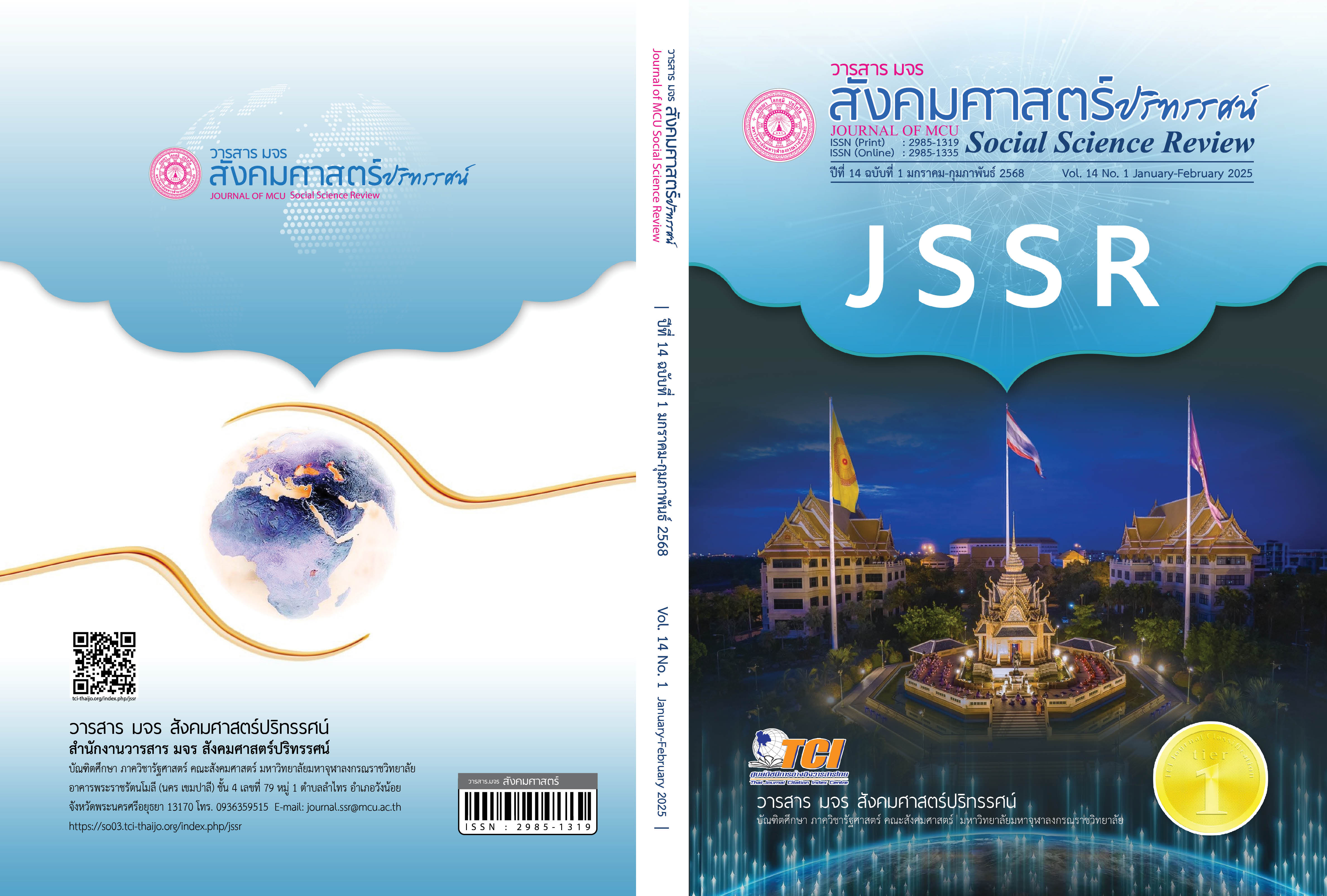การส่งเสริมสุขภาวะผู้สูงอายุในชุมชนเมืองในกรุงเทพมหานคร
คำสำคัญ:
การส่งเสริมสุขภาวะ, ผู้สูงอายุ, ชุมชนเมืองบทคัดย่อ
บทความวิจัยครั้งนี้มีวัตถุประสงค์ 1. ศึกษาบริบทการมีส่วนร่วมของชุมชน 2. ศึกษากิจกรรมที่เหมาะสม และ 3. เสนอแนวทางที่เหมาะสมในการส่งเสริมสุขภาวะผู้สูงอายุในชุมชนเมือง โดยการวิจัยครั้งนี้เป็นการวิจัยเชิงบรรยาย (Descriptive Research) ใช้เทคนิคการรวบรวมข้อมูลเชิงคุณภาพ เครื่องมือที่ใช้ในการวิจัย คือ แบบสัมภาษณ์แบบกึ่งโครงสร้างเก็บรวบรวมข้อมูลโดยการสัมภาษณ์ผู้สูงอายุที่มีอายุมากกว่า 60 ปีขึ้นไป จำนวน 45 คน และผู้ที่มีอายุระหว่าง 45–60 ปี ซึ่งเป็นกลุ่มที่เตรียมความพร้อมเข้าสู่วัยผู้สูงอายุอีก 150 คน วิเคราะห์ข้อมูลด้วยการวิเคราะห์เชิงเนื้อหา (Content Analysis)
ผลการวิจัยพบว่า บริบทของชุมชนเมืองที่มีผลต่อสุขภาวะผู้สูงอายุในประเทศไทย คือ 1. การมีส่วนร่วมของชุมชนในการสร้างระบบนิเวศที่เหมาะสมกับผู้สูงอายุ 2. ลักษณะทางกายภาพของความเป็นเมืองที่ส่งผลต่อสุขภาวะ คือ การพัฒนาพื้นที่สีเขียว การจัดกิจกรรมที่เหมาะสมกับพื้นที่ที่จำกัด และ 3. การเข้าถึงบริการสุขภาพที่สะดวกและทั่วถึง ส่วนกิจกรรมส่งเสริมสุขภาวะผู้สูงอายุในชุมชนเมืองมีกิจกรรมส่งเสริมสุขภาวะ 4 ด้าน ได้แก่ ได้แก่ 1. สุขภาวะทางกาย 2. สุขภาวะทางจิตใจและอารมณ์ 3. สุขภาวะทางสติปัญญา และ 4. สุขภาวะทางสังคม สำหรับแนวทางที่เหมาะสมเพื่อพัฒนากิจกรรมการมีส่วนร่วมของชุมชนในการส่งเสริมสุขภาวะผู้สูงอายุในชุมชนเมือง คือ 1. การจัดการพื้นที่เมือง 2. การเข้าถึงสวัสดิการและการบริการทางสุขภาพ 3. การสนับสนุนด้านสังคมและการมีส่วนร่วมในชุมชน 4. เทคโนโลยีเพื่อผู้สูงอายุ
เอกสารอ้างอิง
ปริญญา ทองมณี. (2566). การวางแผนอายุเกษียณในคนไทยในสังคมผู้สูงอายุ (สารนิพนธ์ศิลปศาสตรมหาบัณฑิต สาขาวิชาเศรษฐศาสตรธุรกิจและการจัดการ). กรุงเทพฯ: จุฬาลงกรณ์มหาวิทยาลัย.
พิมนารา อินทประเสริฐ. (2564). Good Health and Well-being: เมื่อนิยามของสุขภาพดี ไม่ได้หยุดอยู่แค่ร่างกายแข็งแรง. สืบค้น 25 มกราคม 2565, จาก https://shorturl.asia/EWYKk
Asavamongkolkul, A. et al. (2024). Prevalence of osteoporosis, sarcopenia, and high falls risk in healthy community-dwelling Thai older adults: a nationwide cross-sectional study. JBMR Plus, 8(2). 1-11.
Aziz, N. A. et al. (2022). Promoting Sustainable Cities and Communities for Older Persons through Understanding their Preferable Social Activities. IOP Conference Series: Earth and Environmental Science, 1019(1), 1-13.
Chalermsri, C. et al. (2020). Exploring the experience and determinants of the food choices and eating practices of elderly thai people: a qualitative study. Nutrients, 12(11), 3497-3513.
Chang, L. et al. (2024). Depressive disorder benefits of cities: Evidence from the China. Journal of Affective Disorders, 350(1), 420-427.
Chokphukhiao, C. et al. (2024). Revolutionizing elderly care: Building a healthier aging society through innovative long-term care systems and assessing the long-term care acceptance model. Geriatrics & Gerontology International, 4(5), 477-485.
Durongrittichai, V. et al. (2022). The Model of Health Promotion through Health Literacy Approach for the Elderly in Bangkok, Thailand. Asia Social Issues, 15(6), 1-16.
Iamtrakul, P. et al. (2019). The Study on Age-Friendly Environments for an Improvement of Quality of Life for Elderly, Asian Mega City, Thailand. Lowland Technology International, 21(2), 123-133.
Koshakri, R. & Rerkluenrit, J. (2024). Effectiveness of the Thai traditional health tourism activities empowerment program on the active aging of Thai older adults. Journal of Public Health and Development, 22(2). 286-296.
Liu, T. et al. (2024). Research on Planning Strategy for Urban Community Living Environment for the Elderly That Promotes “Living Mutual Aid”. Buildings, 14(6), 1575-1600.
Michel, J.-P. (2020). Urbanization and Ageing Health Outcomes. Journal of Nutrition Health & Aging, 24(5), 463-465.
Osornprasop, S. (2016). Closing the health gaps for the elderly: promoting health equity and social inclusion in Thailand. USA: World Bank Group.
Srichuae, S. et al. (2016). Aging society in Bangkok and the factors affecting mobility of elderly in urban public spaces and transportation facilities. Iatss Research, 40(1), 26–34.
Tcymbal, A. et al. (2022). Interventions simultaneously promoting social participation and physical activity in community living older adults: A systematic review. Frontiers in Public Health, 10(1), 1-18.
Thiamwong, L. et al. (2023). Urbanization, falls, and fear of falling in community-dwelling older adults in thailand. Retrieved March 20, 2020, from https://shorturl.asia/jA4mr
Watana, S. (2022). Buddhism and an Ageing Society in Thailand as a Part of Suvarnabhumi Land. Poligrafi, 27(105/106), 127–147.
Wood, G. (2022). Active and healthy ageing in urban environments: laying the groundwork for solution-building through citizen science. Health Promotion International, 37(4), 1-13.
Zhang, Y. et al. (2022). Social Interaction in Public Spaces and Well-Being among Elderly Women: Towards Age-Friendly Urban Environments. International Journal of Environmental Research and Public Health, 19(2), 746-760.
Zheng, Z. et al. (2019). Transfer of Promotion Effects on Elderly Health with Age: From Physical Environment to Interpersonal Environment and Social Participation. International Journal of Environmental Research and Public Health, 16(15), 2794-2809.
ดาวน์โหลด
เผยแพร่แล้ว
รูปแบบการอ้างอิง
ฉบับ
ประเภทบทความ
สัญญาอนุญาต
ลิขสิทธิ์ (c) 2024 วารสาร มจร สังคมศาสตร์ปริทรรศน์

อนุญาตภายใต้เงื่อนไข Creative Commons Attribution-NonCommercial-NoDerivatives 4.0 International License.
เพื่อให้เป็นไปตามกฎหมายลิขสิทธิ์ ผู้นิพนธ์ทุกท่านต้องลงลายมือชื่อในแบบฟอร์มใบมอบลิขสิทธิ์บทความให้แก่วารสารฯ พร้อมกับบทความต้นฉบับที่ได้แก้ไขครั้งสุดท้าย นอกจากนี้ ผู้นิพนธ์ทุกท่านต้องยืนยันว่าบทความต้นฉบับที่ส่งมาตีพิมพ์นั้น ได้ส่งมาตีพิมพ์เฉพาะในวารสาร มจร สังคมศาสตร์ปริทรรศน์ เพียงแห่งเดียวเท่านั้น หากมีการใช้ภาพหรือตารางหรือเนื้อหาอื่นๆ ของผู้นิพนธ์อื่นที่ปรากฏในสิ่งตีพิมพ์อื่นมาแล้ว ผู้นิพนธ์ต้องขออนุญาตเจ้าของลิขสิทธิ์ก่อน พร้อมทั้งแสดงหนังสือที่ได้รับการยินยอมต่อบรรณาธิการ ก่อนที่บทความจะได้รับการตีพิมพ์ หากไม่เป็นไปตามข้อกำหนดเบื้องต้น ทางวารสารจะถอดบทความของท่านออกโดยไม่มีข้อยกเว้นใดๆ ทั้งสิ้น





